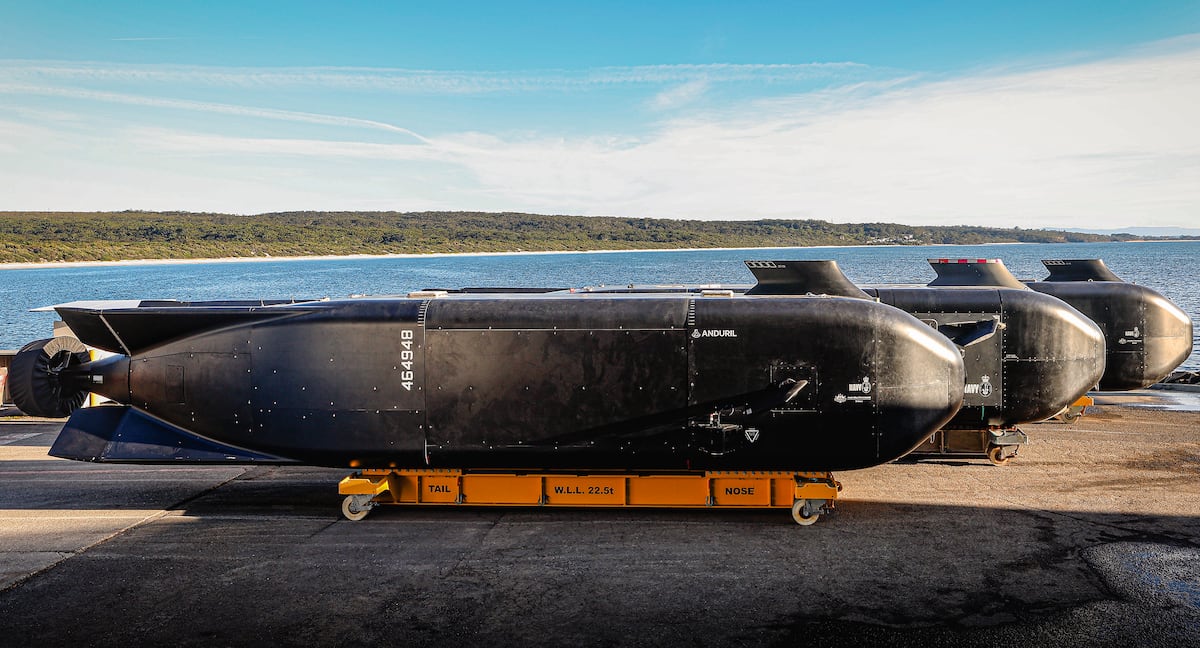



CHRISTCHURCH, New Zealand — Australia, as its interminable wait for nuclear-powered submarines continues, has lodged an order with Anduril Australia for a number of state-of-the-art unmanned submarines to be delivered over the coming five years.
The Royal Australian Navy deal — announced on Sep. 10 after it was signed on Aug. 26 — encompasses a “fleet” of Ghost Shark extra-large unmanned underwater vehicles, or XLUUVs. The contract with Anduril Australia is worth A$1.7 billion, or about US$1.12 billion.
In addition to Ghost Shark production in Australia, the contract covers sustainment and further platform development. The project’s speed is remarkable, going from signature to production in just three years.
Low-rate initial production has commenced already, with expansion to high-rate production slated for next year. Anduril Australia noted that its manufacturing facility can produce “large numbers” of all-electric Ghost Sharks for Australia and allies.
“The Ghost Shark is a world-leading platform made right here in Australia,” Defence Minister Richard Marles commented. “Over the next five years and beyond, it will give navy the intelligence, surveillance and strike capabilities it needs.”
Canberra has already sunk A$145 million into the Ghost Shark development program since April 2022, and Anduril Australia delivered three prototypes plus mission payload modules ahead of schedule.
Anduril explained the Ghost Shark “has been engineered to carry multiple distinct mission payloads, all of which were designed and delivered as part of the R&D program.”
Speaking to Defense News before the announcement dropped, Dr. Ross Babbage, CEO of Strategic Forum, said the advantage of systems like Ghost Shark lies in their deployability at scale.
Their development “has moved very fast, much faster than most people realize,” he explained.
Babbage said a large fleet of autonomous craft would “change the game” in underwater warfare.
“Could we do it? I believe we can,” he said. “The question is [whether it is] a priority.”
This announcement seems to answer that question.
“This achievement reflects what’s possible when defence and industry work shoulder to shoulder: ideating, innovating and inspiring each other to deliver extraordinary advancements in subsea technology,” noted David Goodrich, executive chairman and CEO of Anduril Australia.
The company added that the program “is the direct outcome of a bold decision by the Royal Australian Navy to take on shared risk in pursuit of speed and capability.”
Some 42 Australian firms are already plugged into the supply chain.
The U.S.-based company claimed the Ghost Shark “exceeded the highest expectations” of the navy after trials concluded in June.
“In short, navy’s vision of partnering with Anduril to create a disruptive, highly capable autonomous undersea vehicle that will complement the submarine fleet has been realized,” the statement continued.
Anduril has opened a dedicated Ghost Shark production facility in Rhode Island to serve its U.S. customer as well.
Last year’s National Defence Strategy earmarked uncrewed underwater and surface vessels as a priority for Australia.
In fact, just two days prior to Anduril’s announcement, Leidos revealed on Sept. 8 that it had started constructing a Sea Archer unmanned surface vessel for Australia.
The aluminum-hulled vessel with a 1,500-nautical-mile range can perform surveillance or even strike missions in Australia’s maritime approaches.
Gordon Arthur is an Asia correspondent for Defense News. After a 20-year stint working in Hong Kong, he now resides in New Zealand. He has attended military exercises and defense exhibitions in about 20 countries around the Asia-Pacific region.
